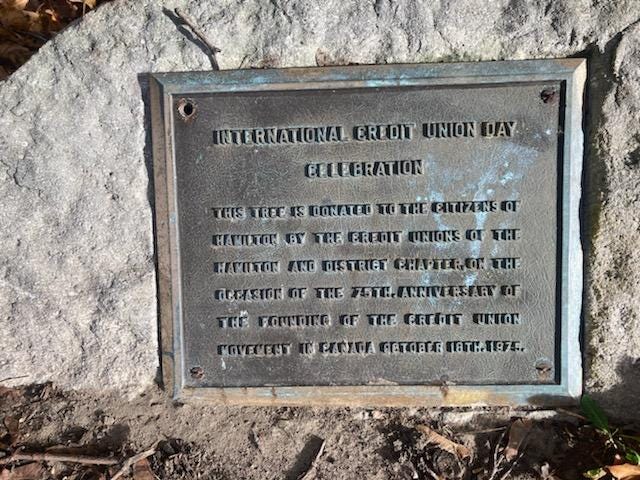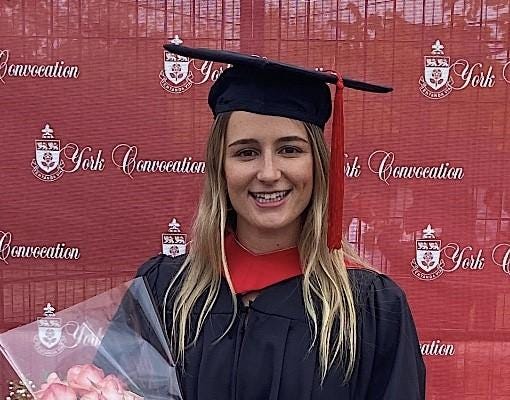Plaque in downtown Hamilton commemorating the 75th anniversary of the founding of the credit union movement in Canada Credit: Doreen Nicoll
I've seen my brothers working,
Throughout this mighty land,
l prayed we'd get together,
And together make a stand.
Then we'd own those banks of marble,
With a guard at every door,
And we would share those vaults of silver,
That we have sweated for!
The Banks are Made of Marble — music and lyrics by Les Rice (1948).
Listen to Pete Seeger’s version.
Erin Flanagan, PhD student in the Graduate Program in Health Policy and Equity at York University in Toronto. Erin’s research interests include the social determinants of health and more specifically, the intersection of health and the environment. Credit: Erin Flanagan
Dennis Raphael, professor of Health Policy and Management at York University should be a familiar voice to listeners. Dennis’ research focuses on the political economy of health inequalities. Credit: Dennis Raphael
Erin Flanagan and Dennis Raphael have just submitted their research paper, Canadian Credit Unions and the Prospects for a Post-Capitalist Economy, for review.
Erin and Dennis maintain the growing polycrisis in Canada is responsible for deteriorating living and working conditions and that is leading to more folks calling for a post-capitalist socialist economy.
In order to achieve a socialist economy, Erin and Dennis want to develop alternative economic structures and processes. They reference the late Erik Olin Wright an American analytical Marxist sociologist at the University of Wisconsin–Madison, who believed in egalitarian alternative futures to capitalism.
Their research looked at the role credit unions can play in promoting Wright’s notions of equality and fairness, democracy and freedom, as well as community and solidarity in a post-capitalist society.
In addition to providing a model of collective ownership for additional areas of food production and distribution, housing, transportation, and telecommunications, credit unions can – in collaboration with other social movements – take on a broad advocacy role in calling for public policy that more equitably distributes economic and social resources to the population.
A case in point is the partnership that formed between FirstOntario Credit Union and RentalRescue to purchase an established apartment building in Hamilton, Ontario as part of a pilot project to help address the affordable housing crisis.
FirstOntario previously partnered with Penn Terra Group Limited and Bethlehem Housing and Support Services, to design and build an affordable housing complex for 127 families in downtown St. Catharines, Ontario.
The success of these projects begs one to ask why, on November 4, 2024, the Ford Conservatives voted against the NDPs Homes Ontario initiative that would have doubled the affordable housing supply by partnering with non-profits and co-ops while protecting renters by bringing back real rent control, ending unethical evictions, and ensuring families can stay in their homes.
Find out why co-operative forms of finance may be the answer to late-stage capitalism and neo-liberalism; how it will move Canadians towards a more equitable world; and how political parties could lead this reformative social movement.
Additional resources:
Thank you Dennis for introducing me to the amazing, must-watch documentary, Poor No more (52 minutes/2010) narrated by Mary Walsh and more relevant than ever during these challenging times in Canada.
The documentary lays out how exactly how Canada’s uber wealthy influence government tax cuts for the wealthy, public policy that regulates the poor, and the rise of capitalism in Canada that undermined and destroyed social safety nets including universal healthcare and childcare.
Dennis calls this “corporate power” — when the right and the one per cent accumulate and exert power to the detriment of the social commons.
Find out how Ireland’s corporate tax cuts benefitted corporations like Waterford Crystal. After Waterford threw its workers under the bus, they fought back to ensure that work and education remained a route out of poverty.
The documentary also travels to Sweden where over 70 per cent of workers are unionized and union representatives sit on the Board of Directors of corporations like McDonald’s, Swedan’s equivalent to the LCBO, SCANIA one of the largest truck makers in the world and even IKEA.
Government, unions and businesses working together for the good of every Swedish citizen — can you even get your head around that?!
And, yes, Swedes love paying taxes because their taxes pay for 16-month parental leave, free childcare, sick days for all workers including part-time employees, as well as guaranteed income during times of need.
Borgen on Netflix shows how Denmark’s minority governments have to work together. This should be the norm in Canada if we had real proportional representation.
Reach Dennis Raphael: draphael@yorku.ca and follow him on @dennisraphael.bsky.social
Contact Erin Flanagan: eflanag2@yorku.ca
Thanks to everyone who read today’s article and listened to my podcast. With your continued support, a little Nicoll can make a lot of change.
Music: Real Estate by UNIVERSFIELD is licensed under a Attribution 4.0 International License. freemusicarchive.org.
*Be sure to download the Substack app to get the most from your podcast













